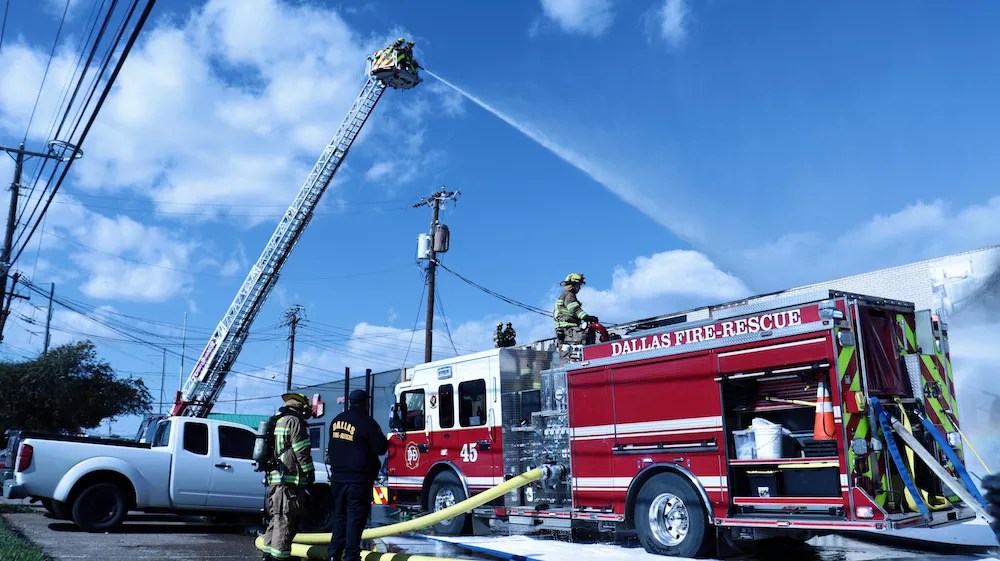
Kurtz Frausun, owner of Studio | Frausun: www.kurtzfrausun.com

Audio By Carbonatix
Four Dallas firefighters have died by suicide since 2018. Two others have attempted suicide. That’s partly why Dallas Fire-Rescue (DFR) started a new program a little over a year ago to address the mental health of its firefighters. While it’s hard to measure how well the program is working, some numbers suggest that it has seen some success. Still, long shifts and about 100 vacancies at DFR makes life at the department even harder and more stressful than it already tends to be.
According to CBS, the National Fallen Firefighters Foundation started tracking these suicides this year. The group has recorded eight suicides across the country, and Texas leads the list with three. The foundation estimates that 100 to 200 firefighters die by suicide every year.
The mental health wellness program at DFR uses several tactics to help firefighters and families in need: counseling, intervention, therapy and other treatment programs.
The department offers several other services to its ranks to tackle mental health. A peer support group is available with 56 trained people to consult after traumatic or stressful situations. All of this falls under the DFR Care Network, which was created a little over a year ago.
A spokesperson for DFR said it’s hard to measure the success of the network, but members of the department have said they feel reassured knowing that services are out there for them. There have been about 250 contacts with the peer support team in the last seven months. About 180 of those calls were referred to professionals.
The Dallas Fire Fighters Association offers three months of counseling for free. The city of Dallas also offers paid mental health leave for employees, including those at DFR. A resiliency coordinator and chaplaincy program is also available to people at DFR.
“One triggers another.” – Jim McDade, Dallas Fire Fighters Association
Jim McDade, president of the Dallas Fire Fighters Association, said everything from the stresses of what they see on calls to the long hours and hard work of the job can impact the mental well-being of firefighters and paramedics at DFR. He thinks the DFR Care Network has helped plenty of people but more could be done to make life easier for firefighters and paramedics at the department.
The need for mental health services in DFR has become apparent over the years. There have been multiple suicides at the department over the last decade. Additionally, McDade noted, some employees have had trouble outside of work, such as incurring DWIs, for one example.
In 2021, DFR Capt. Kenny Crutcher killed himself. According to McDade, this reignited a push for better mental health services in the department. “Kenny’s my best friend,” he said. “It was a really hard time for me when it happened because we had been best friends for a very long time. We worked together for years. We worked at the same station.”
The day after Crutcher killed himself, McDade and DFR Chief Dominique Artis paid his family a visit and were standing in Crutcher’s kitchen. “I said to [Artis], ‘My biggest fear is that this is going to get contagious,'” McDade recalled. “One triggers another,” he said. A couple weeks later, another member of the department died by suicide.
After these two deaths, the department brought in some 60 volunteers with the International Association of Fire Fighters to visit every DFR fire station within a three-day period. The goal was to make known the resources available to people in DFR if they’re struggling with their mental health.
Around this time, the Dallas Fire Fighters Association started providing counseling services to its members. But the department continued to have problems, McDade said. There was another suicide and two more attempts within the span of a year. Since then, the department has hired a psychologist and plans to hire two more.
One of the biggest challenges DFR faces is that a lot of people it hires are coming from a military background. “So, we’ve got guys that are walking in the door who have PTSD,” McDade said. “They have seen things, really bad things, and then we’re bringing them in and putting them in this environment. We owe it to them to make sure that they’re taken care of, but it’s a challenge.” It’s a challenge because he and some others in the department can’t always relate to what others have gone through in the military.
Despite this challenge, he said it’s critical that the department ensure everyone knows there are resources out there for those struggling with their mental health. Some people have told McDade that these mental health services have saved their lives. However, he knows there’s more work to be done.
McDade thinks the department has failed in a lot of ways on mental health. “They talk a great game about mental health and taking care of us, but on the flip side we’re way understaffed right now, and we’re forcing people to work every day,” he said. “It’s not healthy. You know, the whole world right now in every profession talks about work-life balance and all that kind of stuff. We don’t have that. … I think we’re setting ourselves up for bad things because we don’t really take a lot of these things seriously.”
When it comes to struggles with mental health within the DFR, it’s all preventable, as McDade sees it. “We work a dangerous job where people are going to get hurt and bad things are going to happen,” he said. “But when it comes to mental health, we can do something to address those issues.”